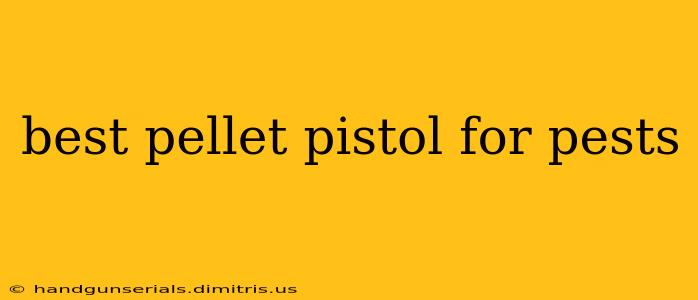Dealing with pests humanely and effectively can be a challenge. Pellet pistols offer a viable option for controlling nuisance animals like rodents and birds, but choosing the right one is crucial. This guide will walk you through the key factors to consider when selecting the best pellet pistol for pest control, along with some top recommendations. Remember, always check your local laws and regulations regarding the use of airguns before purchasing and using any pellet pistol.
Factors to Consider When Choosing a Pellet Pistol for Pest Control
Several factors influence the effectiveness and suitability of a pellet pistol for pest control. Let's explore the most important ones:
1. Power and Accuracy:
- Caliber: .177 caliber (.177") pellets are generally sufficient for smaller pests like rodents. For larger pests, a .22 caliber (.22") might be more effective, offering greater stopping power. However, increased power often means more recoil.
- Velocity: Higher velocity means a flatter trajectory and greater range, crucial for accurate shots at a distance. Look for pistols with velocities suitable for your target pest and the typical distances at which you'll be shooting.
- Accuracy: Accuracy is paramount for humane and effective pest control. A pistol with good accuracy minimizes the risk of missed shots and potential suffering of the pest.
2. Ease of Use and Handling:
- Weight and Balance: A well-balanced pistol is easier to aim and control, especially for extended use. Consider the weight and how it feels in your hand.
- Action Type: Single-action pistols require you to manually cock the hammer before each shot, while double-action pistols allow you to fire with a single trigger pull. Both have advantages and disadvantages depending on your preferences and shooting style.
- Safety Features: A reliable safety mechanism is essential to prevent accidental discharges. Look for pistols with manual safeties that are easily engaged and disengaged.
3. Ammunition Considerations:
- Pellet Type: Different pellet types (e.g., round, pointed, hollow point) offer varying degrees of accuracy and stopping power. Experiment to find what works best for your specific needs.
- Pellet Availability: Ensure that the caliber and type of pellet you choose are readily available and affordable.
4. Legal Considerations:
- Local Laws: Regulations concerning airgun ownership and use vary widely by location. Check your local, state, and federal laws before purchasing and using any pellet pistol.
Top Pellet Pistol Recommendations (General examples - NOT endorsements):
While specific product recommendations are beyond the scope of this general guide to avoid any implications of endorsement, researching high-quality brands known for producing reliable and accurate airguns will be beneficial. Look for pistols with positive customer reviews emphasizing accuracy and ease of use. Always prioritize safety and legality.
Ethical and Responsible Use of Pellet Pistols for Pest Control:
- Consider Alternatives: Explore non-lethal pest control methods first, such as traps or deterrents. Pellet pistols should be a last resort.
- Accurate Shot Placement: Aim for a vital area to ensure a quick and humane kill. Avoid wounding animals.
- Proper Disposal: Dispose of dead pests responsibly and according to local regulations.
Conclusion:
Choosing the best pellet pistol for pest control requires careful consideration of several factors, including power, accuracy, ease of use, and legal compliance. By understanding these factors and prioritizing ethical and responsible use, you can effectively manage pest problems while minimizing harm to both pests and the environment. Remember to consult local regulations and prioritize safety above all else.

